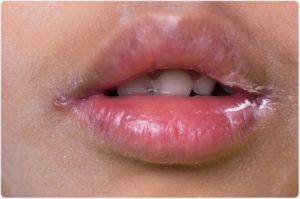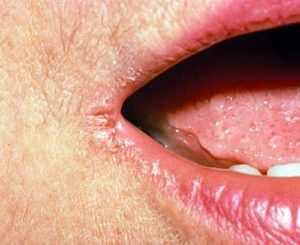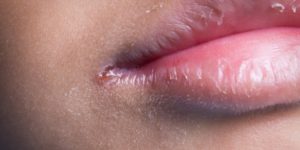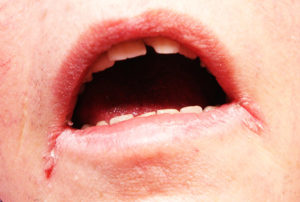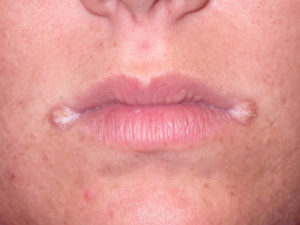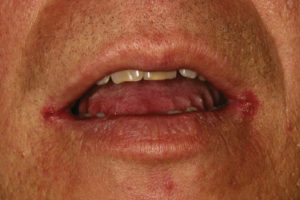Have you ever noticed the corners of your mouth getting sort of puffy, red, and crusty? They may even crack or bleed. Angular cheilitis is an inflammation of the lips that not only looks unappealing, but can also burn and itch. But what is it, and how can we get it to go away?
Most cases of angular cheilitis are the result of excess saliva at the corners of the mouth. People who wear dentures, who wear a mask at work, or children who suck their thumb or use a pacifier may be especially at risk. However, even just licking your lips too much can create the same warm, moist environment that allows cheilitis to develop. Smokers are also at risk, as well as people whose teeth are crooked or don’t line up properly to allow the lips to seal easily when at rest. Basically any condition that leaves the corners of the mouth exposed to too much saliva.
We’ve talked before about how important saliva is to oral health, so why are we suddenly saying too much saliva can actually be a bad thing? It has to do with the type of skin inside your mouth versus outside, as well as what kind of microbes live in each place. The skin (mucosa) on the inside of your mouth is meant to stay wet, and your microbes are generally well balanced to keep that environment healthy. However, the skin of the lips is not meant to stay moist all the time, and fungus can grow like crazy on that part of your face in the right conditions because you don’t have the same kind of beneficial bacteria there to kill them off. To make matters worse, as we feel those annoying little cracks and blisters starting to form, we may lick our lips a lot to soothe the skin which just adds fuel to the fire.
Most mild angular cheilitis will heal with some topicals like petroleum jelly or Neosporin to seal out excess moisture and kill off the aerobic bacteria by smothering them. However, if your cheilitis is fungal or bacterial, you may need to see your doctor for an antifungal or antibacterial ointment. Individuals with diabetes frequently develop these types of fungal and bacterial forms of cheilitis due to the excess sugar in their saliva and blood.
There are many cases where we don’t know exactly how angular cheilitis starts. Many times, studies suggest that it may be caused by nutrient deficiencies. Specifically, individuals lacking sufficient B12 or iron seem to develop these sores more frequently. If you have recurrent angular cheilitis but are not immunocompromised or living with diabetes, try a vitamin B supplement, and make sure you get enough heme iron in your diet if possible. Because keeping your lips comfortable and healthy will help you keep smiling, Orlando!
